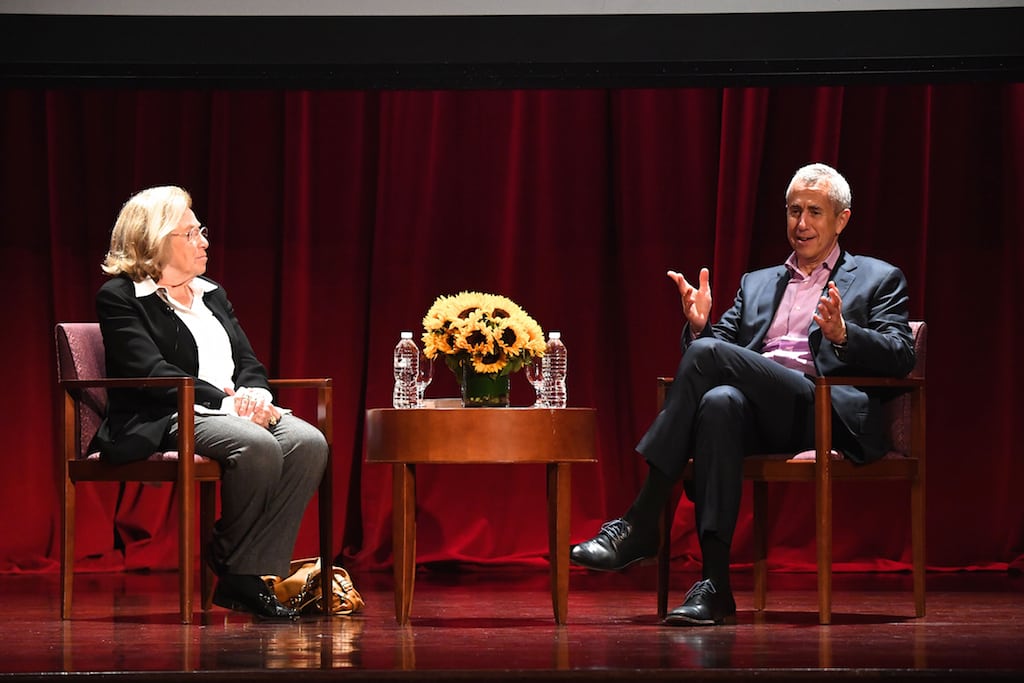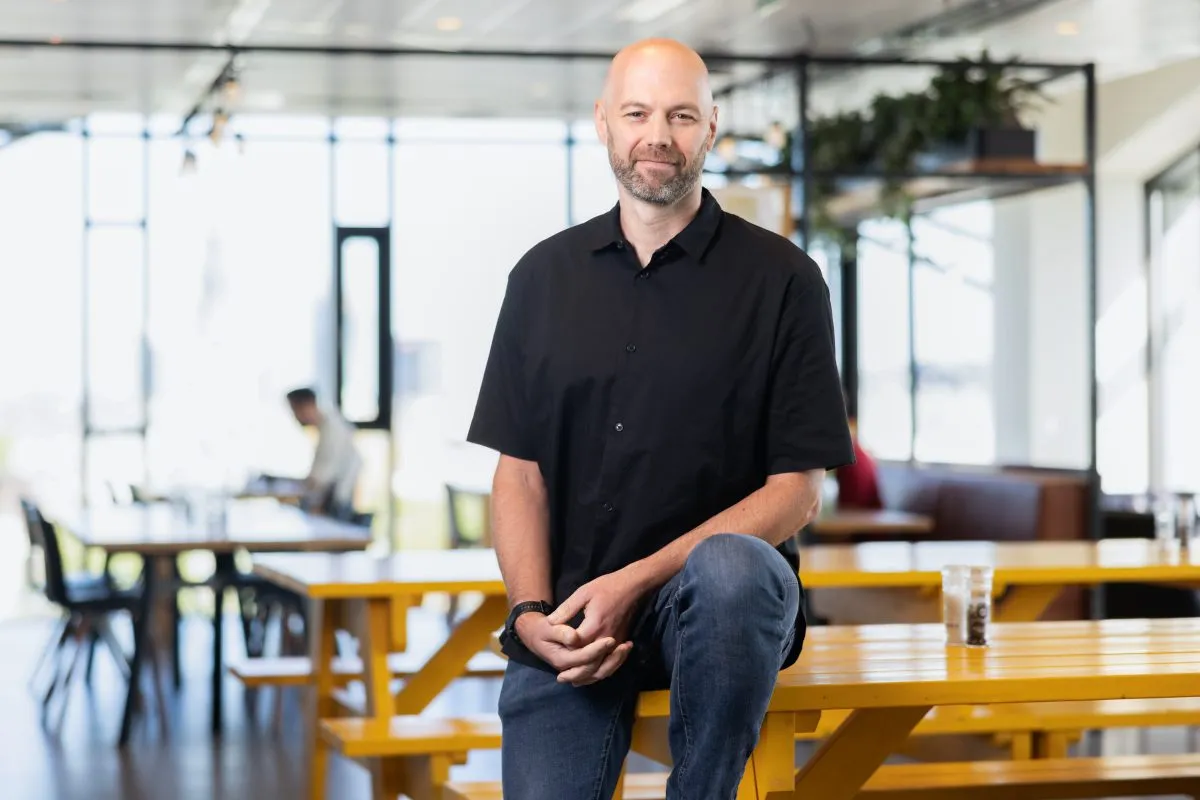6 Basic Lessons in Hospitality From Danny Meyer

Skift Take
Danny Meyer, the famed restauranteur behind beloved New York dining institutions such as Shake Shack, The Modern, Gramercy Tavern, and Union Square Café, has become a leader and a pioneer in the hospitality industry.
As CEO of Union Square Hospitality Group, which has more than a dozen restaurants, Meyer has spoken out about the "transforming power of hospitality in business" and in 2006, he even wrote a book about it, called Setting the Table. Most recently, he also became one of a handful of chefs to employ a no-tipping policy at his restaurants, which he is rolling out on a restaurant-by-restaurant basis.
And on Nov. 9, Meyer came to New York University's Tisch Center for Hospitality and Tourism to speak about "Enlightened Hospitality: The Transforming Power of Putting People First."
What Meyer discussed on stage with Food & Wine and FoodArts founder Arianne Batterberry didn't just apply to the business of restaurants or hospitality for that matter. In fact, much of what he spoke about transcended hospitality. Like the Skift Supertraveler Manifesto showed, Meyer made the case for all customer-facing businesses, regardless of industry, to bring back humanity to their brands.
Here are six takeaways from Meyer's discussion that can be universally applied to the travel industry:
1. All travel brands could benefit from having more "HQ"
Meyer said that when he hires for his company, he always tries to figure out what kind of HQ, or hospitality quotient, a person has. This, he said, helps him gauge whether someone has genuine hospitality, or that characteristic whereby "you feel better when you make other people feel good."
Six emotional skills, he said, make up HQ. They include: being kind and optimistic, or having hope; having an intellectual curiosity; a strong work ethic; having empathy; having self-awareness; and most importantly, having integrity.
"Hospitality is a team sport," Meyer said. When employees have a high HQ, everyone benefits, including customers.
2. Fine casual is proof you don't have to sacrifice quality for great value
When asked what the next big thing in restaurants was, Meyer said, "It's fine casual and it's already here." If fast food is the combination or speed and price, fine casual is the combination of "everything we know from fine dining" applied to the systems of casual dining.
Some examples of this concept that have proven to be hugely successful, he said, include Chipotle, Sweetgreen, Tender Greens, Cava Grill and, of course, Shake Shack,
Similarly, one of this year's Skift Megatrends for 2016 was "The Rise of Fast Casual Design." Consumers today want simplicity, and they want great value and quality for a great price.
3. All criticism is good, in its own way
When asked what he thought of today's complex ecosystem of critics, from amateur Instagram food critics and Yelpers to established restaurant reviewers, Meyer said he welcomed all criticism and that, no matter what, it's better to know what the criticisms are than never knowing how he can improve the guest experience.
Similarly, Meyer's view of the critics could also be applied to hotels, airlines, cruises, tour operators, and car rental companies alike. While many travel businesses would rather avoid some of the less flattering reviews they receive on sites like TripAdvisor, for example, they shouldn't do that because they're missing out on an opportunity to get better.
Research backs up Meyer's claims: a recent study found that hotels that respond to TripAdvisor reviews will see their revenues rise, at least up to a point.
4. Give your employees a higher purpose beyond a paycheck, or tips
Meyer's pioneering Hospitality Included method of eliminating tips from restaurant service is still a work in progress but, he said, it's benefitting all of his employees and, in that way, it's also benefitting his diners, too.
He said that while the decision to ban tipping in his restaurants was a controversial one, it all ties back to the idea that "the only way to motivate someone is to give them a higher purpose beyond a paycheck."
"I learned to treat people as if they are volunteers," Meyer said, talking about one of his earliest memories, working on a John B. Anderson's presidential campaign back in 1980. "You can have the best recipe in the world, but it'll never taste better than the worst ingredient." In other words, one bad apple can leave a bad taste.
Likewise, when Two Roads Hospitality CEO Niki Leondakis spoke at the Skift Global Forum in New York City this September, she argued that for hotels to foster genuine human connections with its guests, it needs to look to its employees first. It's not about trying to find the next great piece of technology or the most stunning light fixture; it's about empowering employees so they can provide the best customer service possible.
5. Never stop getting better
An audience member, at one point, asked Meyer how he defined success and whether he thought he was successful. Meyer answered that, for him, success isn't defined by money. Instead, it's a feeling.
"If you're feeling like you're finding your balance between your spiritual needs, emotional needs, and physical needs, that, to me, is success," he said.
Because of that, Meyer said he believes "there's always room for improvement."
6. Use technology to be more human
Most recently, Meyer announced that when he reopens Union Square Café, all of his managers and sommeliers will be equipped with Apple Watches that are synced to a new reservations system from Resy. That system will not only help the restaurant staff manage reservations but it will also act as a customer revenue management system or loyalty program of sorts, storing data on diners.
"Technology," Meyer said, "should be used to amplify your ability to use your heart" when offering hospitality.




